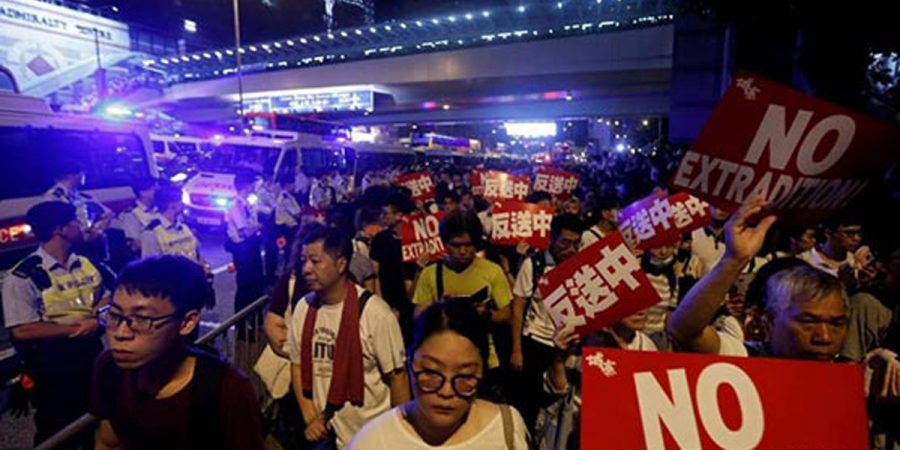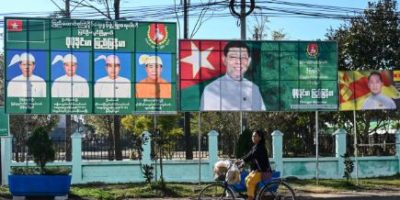Hundreds of thousands march in Hong Kong to protest China extradition bill

HONG KONG (DNA) – Hong Kong was plunged into a fresh political crisis on Sunday night after more than half a million people took to the streets to thwart a proposed extradition law that would allow suspects to be sent to mainland China to face trial.
Organisers said the turnout outstripped a demonstration in 2003 when 500,000 hit the streets to challenge government plans for tighter national security laws.
Those laws were later shelved and a key government official forced to resign. Sunday’s outpouring was already raising the pressure on the administration of Hong Kong Chief Executive Carrie Lam and her official backers in Beijing.
“She has to withdraw the bill and resign,” veteran Democratic Party lawmaker James To told crowds outside the city’s parliament and government headquarters on Sunday night.
“The whole of Hong Kong is against her.”
After To spoke, thousands were still arriving, having started the march five hours earlier, filling four lanes of a major thoroughfare. Some sat in a nearby park singing “Hallelujah” while police increased their numbers around the area.
Lam had yet to comment on the rally. The demonstration capped weeks of growing outrage in the business, diplomatic and legal communities, which fear corrosion of Hong Kong’s legal autonomy and the difficulty of ensuring basic judicial protections in mainland China.
The protest descended into violence in the early hours of Monday as several hundred protesters clashed with a similar number of police outside the city’s parliament.
Protesters charged police lines to try to force their way into the Legislative Council building, and police charged back, using pepper spray, after warning the protesters. The standoff ended in the early hours of Monday.
U.S. and European officials have issued formal warnings – concern matched by international business and human rights lobbies that fear the changes would dent Hong Kong’s rule of law. The former British colony was handed back to Chinese rule in 1997 amid guarantees of autonomy and various freedoms including a separate legal system, which many diplomats and business leaders believe is the city’s strongest remaining asset.
The unusually broad opposition to the rendition bill displayed on Sunday came amid a series of government moves to deepen links between southern mainland China and Hong Kong.
Police had yet to issue their own estimate of the protest size. But as tens of thousands reached the Legislative Council in the Admiralty business district, the starting point in Victoria Park was crowded with thousands more still waiting to join the march.
Some carried yellow umbrellas – a symbol of the pro-democracy Occupy protests that choked key city streets for 79 days in 2014.
Streets were packed along the route. Reuters witnesses at various key points estimated the crowd at several hundred thousand.
Chants of “No China extradition, no evil law” echoed through the city streets, while other marchers called for Lam and other senior officials to step down.
BROAD-BASED, GOOD-NATURED PROTEST
One protester held a sign reading: “Carry off Carrie”, while another declared: “Extradite yourself, Carrie”. Another sign said: “Let’s make Hong Kong great again”, with a photo depicting U.S. President Donald Trump firing Lam.
The genial crowd included young families pushing babies in prams as well as the elderly braving 32-degree C (90 F) heat, some spraying each other with water misters.
Debates will start in the council on Wednesday on the amendments to the Fugitive Offenders Ordinance. The bill could be passed into law by the end of June.
Lam has tweaked the amendments but refused to pull the bill, saying it is vital to plug a long-standing “loophole”.
She has also said speedy action is needed to ensure a Hong Kong man suspected of murdering his girlfriend can be sent to Taiwan for trial.
Opposition to the bill has united a broad range of the community, from usually pro-establishment business people and lawyers to students, pro-democracy figures and religious groups.
Insurance agents, executives and small entrepreneurs joined bus drivers and mechanics in the streets on Sunday. Dozens of people told Reuters it was their first protest march, with some remarking on the strong sense of unity among the diverse crowds.
“I come here to fight,” said a wheelchair-bound, 78-year-old man surnamed Lai, who was among the first to arrive.
Teacher Garry Chiu joined the protest with his wife and 1-year-old daughter, saying: “It is no longer about me.”
“I need to save my daughter. If the law is implemented, anyone can disappear from Hong Kong. No one will get justice in China. We know there are no human rights,” Chiu added.
“The extradition bill will directly threaten the core values of Hong Kong and rule of law,” said 21-year-old Kelvin Tam, a student in London. “It will remove the firewall of Hong Kong judicial independence.”
CRITICISM OF BILL
The amendments would simplify case-by-case arrangements to allow extradition of wanted suspects to jurisdictions, including mainland China, Macau and Taiwan, beyond the 20 with which Hong Kong already has extradition treaties.
Opponents of the bill question the fairness and transparency of the Chinese court system and worry about Chinese security forces contriving charges.
Chris Patten, the last British governor of Hong Kong, said on Thursday the bill would “strike a terrible blow … against the rule of law, against Hong Kong’s stability and security, against Hong Kong’s position as a great international trading hub”.
Foreign governments have also expressed concern, warning of the impact on Hong Kong’s reputation as an international financial hub, and noting that foreigners wanted in China risk getting ensnared in Hong Kong.
Concerns were highlighted on Saturday with news that a local high court judge had been reprimanded by the chief justice after his signature appeared on a public petition against the bill.
Reuters reported earlier that several senior Hong Kong judges were worried about the changes, noting a lack of trust in mainland courts as well as the limited nature of extradition hearings.
Human rights groups have repeatedly cited the alleged use of torture, arbitrary detentions, forced confessions and problems accessing lawyers in China.
Hong Kong officials have defended the plans, even as they raised the threshold of extraditable offences to crimes carrying penalties of seven years or more.
They say the laws carry adequate safeguards, including the protection of independent local judges who will hear cases before any approval by the Hong Kong chief executive. No one would be extradited if they face political or religious persecution or torture, or the death penalty, they say.
“We continue to listen to a wide cross-section of views and opinions and remain to open to suggestions on ways to improve the new regime,” a government official said on Sunday.
Related News

Myanmar junta seeks to prosecute hundreds for election ‘disruption’
YANGON, DEC 17: Myanmar’s junta said Wednesday it was seeking to prosecute more than 200Read More

Pakistan–Russia Strategic Partnership Strengthens Eurasian Regional Cooperation
MOSCOW, DEC 17 /DNA/: Mushahid says ‘Pakistan-Russia are strategic partners in Eurasia’, announces ‘Eurasian ConnectivityRead More


Comments are Closed